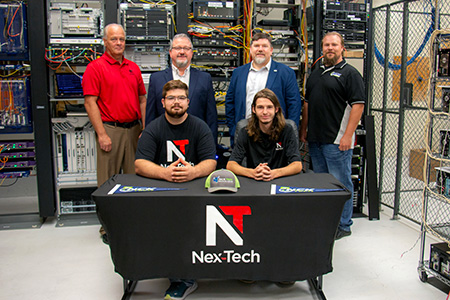 As the Internet continues to become more relevant and essential to our daily lives, it’s increasingly critical to ensure that telecommunications infrastructure is reliable, secure, and capable of meeting the demand. Paired with the rapid pace of technological advancement and the digital transformation of more and more industries and sectors, the world is facing a pressing need for a skilled workforce who can meet the demands of the 21st century economy.
As the Internet continues to become more relevant and essential to our daily lives, it’s increasingly critical to ensure that telecommunications infrastructure is reliable, secure, and capable of meeting the demand. Paired with the rapid pace of technological advancement and the digital transformation of more and more industries and sectors, the world is facing a pressing need for a skilled workforce who can meet the demands of the 21st century economy.
That’s where workforce development comes in.
NTIA has created the Telecommunications Training and Workforce Development Best Practice Checklist to help support Eligible Entities as they’re developing their BEAD workforce plans. The checklist is designed to help select programs, partnerships, and activities for their plans that will collectively help them address the workforce requirements and guidance in the BEAD Notice of Funding Opportunity (NOFO) and ensure that there is a skilled workforce prepared to connect the unserved and underserved.
This blog series highlights a showcase of case studies that demonstrate use of the checklist across a range of programs offered by industry, higher education, and state partners. The series will highlight examples reflective of the diverse range of training programs currently in operation, including those run by nonprofit organizations, workforce intermediaries, private sector employers, labor unions, community and technical college systems, and industry associations, to name a few.
High-Speed Internet Application:
☒ Focused on fulfilling a need required for high-speed Internet deployment
Program Design:
☐ Industry-led sectoral partnership including labor
☒ Employer-led curriculum development
☐ Earn and learn model
☒ Direct-to-employment
☒ Stackable, industry-recognized credentials
☒ Local hire
☐ Recruit from underserved communities
☒ Wrap-around services
☐ Measure and evaluate outcomes
Employer Partners:
☒ Have workforce needs
☒ Engaged in program design and make hiring commitments
☐ Recruit from underserved communities
☒ Local hire
☒ Skills-based assessment of applicants
☒ Provide living wages and benefits
Background
Headquartered in Lenora, Kansas, Nex-Tech has been connecting people and businesses in rural Kansas for more than 70 years. In 1987, they were the first company in Northwest Kansas to offer services over fiber.
Today, Nex-Tech has over 340 employees but expects to see many retirements in the coming years and is focused on recruiting the next generation of talent for the company. In rural areas like Northwest Kansas, however, it can be a challenge to recruit, hire, and retain workers in the local area.
Program Overview
Anticipating a potential staff shortage, Nex-Tech partnered with North Central Kansas Technical College (NCK Tech) in 2021 to revamp their Telecommunications and Network Technology program. The program was originally based at the main campus in Beloit but was relocated to Hays and launched in the fall of 2022.
Close to Nex-Tech’s Lenora headquarters, the program offers a two-year Associate of Applied Science Degree. Fort Hays State University (FHSU), also in Hays, has a gateway partnership program with NCK Tech, through which students in the program receive access to FHSU housing, dining halls, athletic facilities, and more. Students train in circuits, devices and cabling, digital logic, fiber optic technology, and Voice Over Internet Protocol (VoIP). They earn industry certifications, and learn to analyze data networks, LAWN/WAN design, and central office applications.
The program is funded by Nex-Tech, alongside industry partners Golden Belt Telephone and Nex-Tech Wireless. Nex-Tech additionally provides NCK Tech with training lab space, equipment, and input on the program’s curriculum. Through the Technology Education Sponsorship Program, the company fully funds a student’s tuition, books, and tools for a three-year work commitment post-graduation.
The scholarship program sponsored just three participants in its first year running but has doubled applications for its second: a modest beginning for this workforce pipeline the company is looking to grow. Though expansion is limited by classroom space and available instructors, vendors have been eager to provide guest lecturers and curricular input to support the program.
Between terms, Nex-Tech additionally offers direct hands-on technical training and professional education through the paid Nex-Generation Internship program. For those without relatives in the industry, internship experiences expose young people to the possibilities available through a telecommunications career. Outside of the Telecommunications and Network Technology program, other FHSU students often work part-time for Nex-Tech’s help desk, after which many go on to explore technician and IT roles at the company. Seasoned employees report enjoying the culture of mentorship that has developed since these programs began.
Through these efforts, Nex-Tech is helping cultivate a skilled workforce, ready to take on the challenges of connecting everyone in Kansas to high-speed Internet service.
Download the Workforce Planning Guide
The Workforce Planning Guide supports Eligible Entities developing submissions to Internet for All programs. It supports the development of workforces for grant implementation as well as designing workforce plans and standards for subgrantees.

